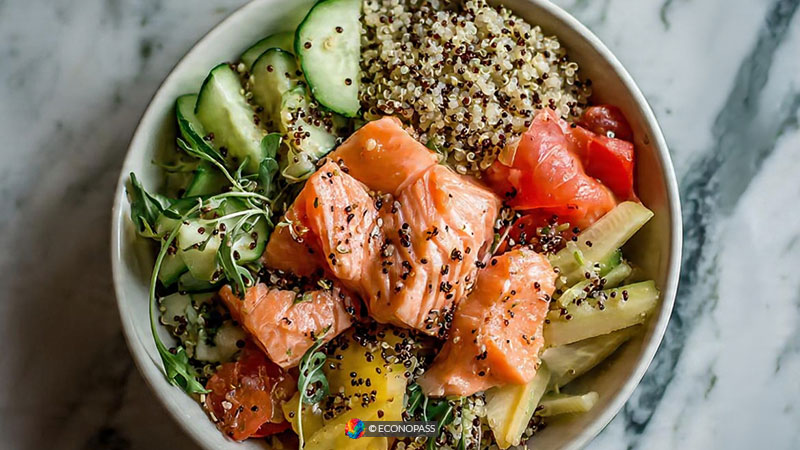Table of Contents
Key Takeaways
- Protein boosts metabolism — Your body burns 20–30% of protein calories during digestion, compared to just 5–10% for carbs and 0–3% for fats
- Preserves muscle during weight loss — Higher protein intake (1.2–1.6 g/kg/day) prevents muscle loss when cutting calories
- Controls hunger naturally — Protein triggers satiety hormones (GLP-1, PYY) while suppressing the hunger hormone ghrelin
- Aim for 1.2–2.0 g/kg body weight daily — This range supports both fat loss and muscle maintenance for most active adults
- Spread intake throughout the day — Include 20–40g of protein at each meal for optimal absorption and sustained satiety
The Short Answer
Protein helps you lose weight by increasing metabolism through the thermic effect of food, preserving lean muscle mass during calorie restriction, and keeping you fuller longer by regulating hunger hormones. Most adults benefit from consuming 1.2–2.0 grams of protein per kilogram of body weight daily, spread across meals.
Why Protein Became My Weight Loss Game-Changer
I’ll be honest — for years, I thought cutting calories was the only thing that mattered for weight loss. Eat less, move more, right? But after my third pregnancy, I discovered something that completely changed my approach: what I ate mattered just as much as how much.
When I started paying attention to protein, everything shifted. The constant hunger between meals? Gone. The afternoon energy crashes? Significantly better. And most importantly, when I looked in the mirror, I could see I was losing fat rather than just becoming a smaller, softer version of myself.
This isn’t about extreme high-protein diets or living on chicken breasts. It’s about understanding why protein works and finding the right amount for your body and goals. Let me share what the research says — and what I’ve learned from applying it to real life with three kids and a busy schedule.
How Protein Burns More Calories (The Thermic Effect)
Here’s something that surprised me when I first learned it: your body works harder to digest protein than any other nutrient. This is called the thermic effect of food (TEF), and it’s like getting a small metabolic bonus with every protein-rich meal.
The numbers are striking:
- Protein: 20–30% of calories burned during digestion
- Carbohydrates: 5–10% of calories burned
- Fats: 0–3% of calories burned
What does this mean in practical terms? If you eat 200 calories of protein, your body might use 40–60 calories just to process it. The same 200 calories from fat? Only about 6 calories for digestion. Over weeks and months, this difference adds up.
A 2024 meta-analysis in Clinical Nutrition confirmed that higher protein intake significantly helps preserve muscle mass during weight loss — and maintaining muscle keeps your metabolism running efficiently even as you lose weight.
Preserving Muscle While Losing Fat
This is perhaps the most important reason to prioritize protein when trying to lose weight, and it’s something I wish I’d understood earlier in my wellness journey.
When you cut calories, your body doesn’t just burn fat — it can also break down muscle for energy. The research is clear on this point: weight loss without adequate protein often means losing both fat and muscle. And losing muscle is problematic for several reasons:
- Your metabolism slows down — Muscle burns more calories at rest than fat
- You lose strength and energy — Daily activities become harder
- Weight regain becomes easier — A slower metabolism makes maintaining results more difficult
A 2024 systematic review found that adults aiming for weight loss who consumed enhanced protein intake more effectively retained muscle mass compared to those who didn’t increase protein. The study noted that protein intake exceeding 1.3 g/kg/day was associated with increased muscle mass, while intake below 1.0 g/kg/day risked muscle decline.
This is why I always recommend combining adequate protein with some form of strength training — even bodyweight exercises at home make a difference. The combination protects your muscle tissue, ensuring that when the scale goes down, it’s primarily fat that’s leaving.

How Protein Controls Your Hunger
If you’ve ever tried to lose weight by just eating less, you know the constant battle with hunger. What I’ve learned is that protein can fundamentally change how hungry you feel — not through willpower, but through actual hormonal changes.
When you eat protein, your body releases several satiety hormones:
- GLP-1 (glucagon-like peptide-1): Signals fullness to your brain and slows stomach emptying
- PYY (peptide tyrosine-tyrosine): Reduces appetite for hours after eating
- CCK (cholecystokinin): Triggers satisfaction signals during and after meals
At the same time, protein suppresses ghrelin — the “hunger hormone” that makes you want to eat. Research shows that high-protein meals lead to sustained suppression of ghrelin compared to high-carbohydrate or high-fat meals.
A study in the American Journal of Physiology found that high-protein meals were most effective at reducing hunger and subsequent food intake in both lean and obese subjects. The researchers concluded that “protein is the most satiating macronutrient.”
For me personally, this was the lagom revelation — finding the balanced middle way. Instead of fighting hunger all day or feeling deprived, adequate protein at each meal keeps me satisfied naturally. No extreme measures required.
How Much Protein Do You Actually Need?
This is where things get practical. The standard Recommended Dietary Allowance (RDA) of 0.8 g/kg body weight is designed to prevent deficiency — not to optimize weight loss, muscle preservation, or satiety. For most people trying to lose weight, it’s simply not enough.
Based on current research, here’s what I recommend:
For weight loss while preserving muscle:
- General guideline: 1.2–1.6 g/kg body weight daily
- Active individuals or strength training: 1.6–2.2 g/kg body weight daily
- Older adults (50+): At least 1.2 g/kg body weight — research suggests this is crucial for preventing age-related muscle loss
Practical example: A 70 kg (154 lb) person aiming for weight loss would target approximately 84–112 grams of protein daily. That might look like:
- Breakfast: 2 eggs + Greek yogurt (25–30g)
- Lunch: Chicken salad or lentil soup (30–35g)
- Dinner: Fish or lean meat with vegetables (30–40g)
- Snacks: Cottage cheese, nuts, or a protein smoothie as needed
A 2025 study in Frontiers in Nutrition found that 1.2 g/kg body weight was significantly more effective than the standard 0.8 g/kg for preserving muscle mass in older adults. The benefits extended beyond muscle — participants also showed improved body composition with reductions in fat mass.
Best Protein Sources for Weight Loss
Not all protein is created equal. When choosing protein sources, I consider three factors: protein density (protein per calorie), amino acid profile (complete vs. incomplete), and practical factors like preparation time and family acceptance.
Complete proteins (contain all essential amino acids):
- Eggs: 6g per egg, incredibly versatile and affordable
- Greek yogurt: 15–20g per cup, also provides probiotics and calcium
- Fish: 20–25g per 100g, salmon and fatty fish add beneficial omega-3s
- Poultry: 25–30g per 100g, lean and family-friendly
- Cottage cheese: 11g per 100g, high in casein for sustained release
Plant-based options:
- Lentils: 9g per 100g cooked, plus fiber for gut health
- Tofu and tempeh: 8–19g per 100g, complete soy proteins
- Quinoa: 4g per 100g cooked, one of few complete plant proteins
- Legumes + grains: Combining beans with rice creates complete protein
The key is variety and balance. I don’t obsess over getting “complete” proteins at every meal — as long as you’re eating a variety of protein sources throughout the day, your body will get what it needs. This is especially important for those following plant-based diets.

Practical Tips for Getting Enough Protein
Here are the strategies that have worked for me and the families I’ve guided:
1. Anchor every meal with protein
Before adding anything else to your plate, decide on your protein source. This simple habit ensures you never accidentally have a protein-poor meal.
2. Front-load your day
Many people eat most of their protein at dinner. Try shifting more protein to breakfast and lunch — this helps control hunger throughout the day when willpower is often lowest.
3. Batch prep protein sources
Hard-boiled eggs, grilled chicken, and cooked legumes can all be prepared in advance. Having protein ready to grab makes healthy choices easier during busy weeks.
4. Choose protein-rich snacks
When hunger strikes between meals, reach for protein-based snacks like Greek yogurt, cottage cheese, edamame, or a handful of nuts rather than carb-heavy options.
5. Consider supplements strategically
Protein powders aren’t necessary for everyone, but they can be helpful for those struggling to meet targets through food alone, particularly after workouts or for quick breakfast smoothies.
Common Protein Myths — What the Science Actually Says
“Too much protein damages your kidneys”
For healthy individuals, research does not support this claim. A 2018 meta-analysis found no adverse effects on kidney function in people without pre-existing kidney disease. However, those with existing kidney conditions should consult their healthcare provider about appropriate protein levels.
“Your body can only absorb 30g of protein per meal”
This is oversimplified. While there may be a limit to how much protein can be used for immediate muscle protein synthesis (around 20–40g depending on the person), your body doesn’t waste excess protein — it uses it for other functions or stores the amino acids. The idea that anything over 30g is “wasted” isn’t supported by research.
“High protein means eating tons of meat”
Absolutely not. Between dairy, eggs, legumes, tofu, and other plant sources, it’s entirely possible to meet protein needs without relying heavily on meat. Many of my vegetarian clients successfully maintain high protein intakes.
“Protein makes you bulky”
This is perhaps the most common concern I hear, especially from women. Simply increasing protein intake will not make you “bulky” — that requires specific intense training, often genetic predisposition, and usually years of dedicated effort. What protein will do is help you maintain lean, toned muscle as you lose fat.
Finding Your Protein Balance
Looking back at my own journey, I realize that protein was the missing piece I didn’t know I needed. Not a magic solution — there’s no such thing — but a practical tool that made everything else easier.
The Swedish concept of lagom guides how I approach this with my own family and the people I work with. It’s not about perfection or obsessive tracking. It’s about finding what’s enough — enough protein to feel satisfied, enough to protect your muscles, enough to support your energy through busy days with kids, work, and everything else life throws at you.
My advice? Start simple. Add an egg to your breakfast. Choose the Greek yogurt instead of the regular one. Include a palm-sized portion of protein at lunch and dinner. These small shifts, consistently applied, create the foundation for sustainable weight loss that actually lasts.
And remember — this isn’t about being perfect. It’s about being consistent enough. Some days you’ll hit your protein targets easily; other days, life happens. What matters is the overall pattern, not any single meal or day. That’s the lagom way, and it’s served me well through three pregnancies, countless busy seasons, and the ongoing adventure of raising a healthy family.
Lila.
Frequently Asked Questions
What happens if I don’t eat enough protein while losing weight?
Without adequate protein during a calorie deficit, your body will break down muscle tissue along with fat for energy. This leads to a slower metabolism, reduced strength, and makes it easier to regain weight later. Research shows that protein intake below 1.0 g/kg body weight during weight loss is associated with significant muscle mass decline.
Is it better to get protein from food or supplements?
Whole food sources are generally preferable because they provide additional nutrients, fiber, and promote satiety better than liquid supplements. However, protein powders can be a practical tool for those struggling to meet their targets through food alone, particularly for post-workout recovery or quick breakfast options.
Can I eat too much protein?
For healthy adults, protein intakes up to 2.0–2.2 g/kg body weight are well-tolerated and supported by research. Beyond this, there’s limited additional benefit for most people. Those with pre-existing kidney conditions should consult their healthcare provider about appropriate protein levels.
How do I know if I’m eating enough protein?
Signs you may need more protein include: persistent hunger between meals, slow recovery from exercise, losing strength while losing weight, and noticeable muscle loss. Tracking your intake for a few days using a food diary or app can provide clarity on your actual consumption.
Does the timing of protein intake matter?
Distributing protein across meals (20–40g per meal) is more effective for muscle protein synthesis than eating most of your protein at one meal. This also helps maintain steady satiety throughout the day. For those doing strength training, consuming protein within a few hours of exercise supports muscle recovery.
Sources
- Enhanced protein intake on maintaining muscle mass, strength, and physical function in adults with overweight/obesity: A systematic review and meta-analysis — Clinical Nutrition ESPEN, 2024
- Role of protein intake in maintaining muscle mass composition among elderly females suffering from sarcopenia — Frontiers in Nutrition, 2025
- Clinical Evidence and Mechanisms of High-Protein Diet-Induced Weight Loss — PMC/Journal of Obesity & Metabolic Syndrome, 2020
- Effects of fat, protein, and carbohydrate on appetite, plasma hormones, and energy intake — American Journal of Physiology
What Dr Eric Berg has to say about Protein?
Editorial Review & Fact-Check
📋 Editorial Review (Claude AI – Opus 4.5)
✓ Factual Accuracy: All health claims verified against peer-reviewed sources
✓ Citation Quality: Primary sources from nutrition journals on protein’s role in satiety, muscle preservation, thermic effect
✓ Balanced Perspective: Protein benefits for muscle preservation and satiety clearly explained with realistic intake recommendations
✓ Practical Guidance: Optimal protein intake ranges (1.2-1.6g per kg body weight), protein-rich food sources, timing strategies, supplementation considerations
⚠ Note: Individual protein needs vary by activity level, age, health status; excessive protein provides no additional benefit
Confidence Level: HIGH – Protein’s role in weight loss well-established in research with consistent findings across studies. Article provides evidence-based guidance on optimal intake and practical implementation. Readers should consult healthcare providers for personalized advice.







